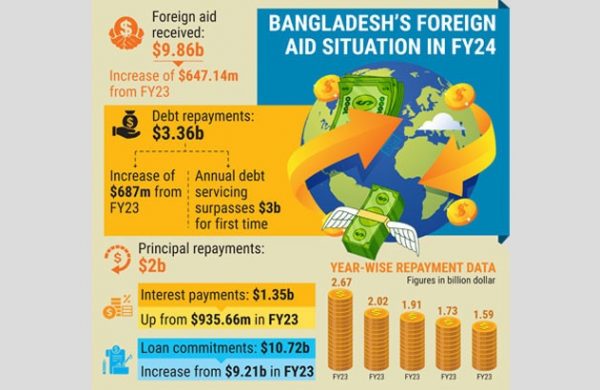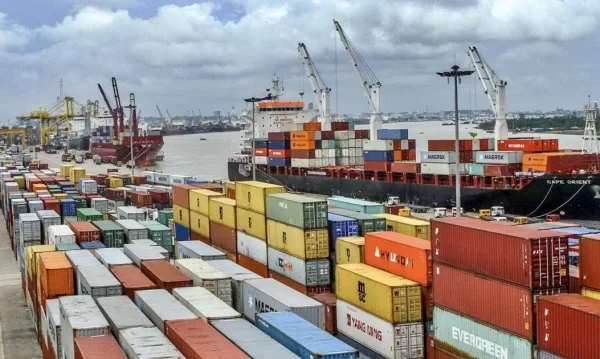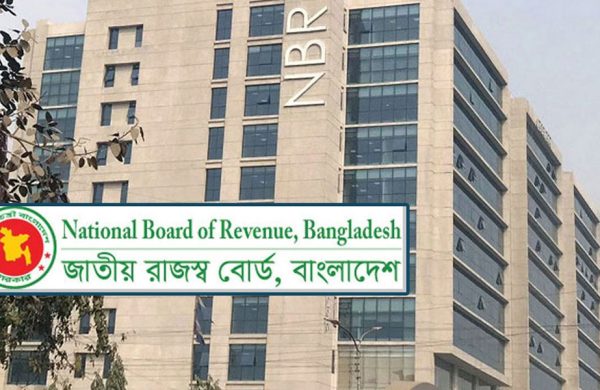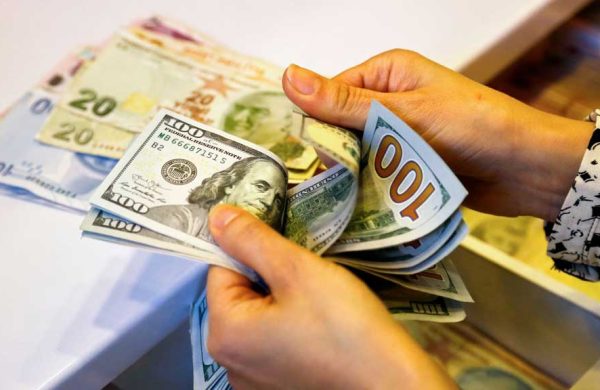Foreign debt dilemma: Repayments outpace inflow growth in FY24
- Update Time : Monday, July 29, 2024

TDS Desk:
Bangladesh is grappling with a mounting foreign debt crisis as repayment obligations surged in fiscal 2023-24, outpacing the increase in foreign aid, raising concerns among experts about economic pressures.
Despite a modest rise in overall aid, the country shelled out nearly $40 million more on debt servicing than it received in additional assistance.
According to latest data, the country received approximately $9.86 billion in foreign aid in FY24, marking a modest increase of $647.14 million compared to the previous fiscal year. However, repayments surged to $3.36 billion, an increase of $687 million over the last fiscal year.
Experts warn that this alarming trend, coupled with the looming repayment of mega-project loans, could exacerbate economic pressures and stifle development.
The latest report from the Economic Relations Division (ERD) unveiled on Sunday that Bangladesh’s total repayments in FY24 were $3.36 billion, the highest ever for the country.
For the first time, annual foreign debt servicing, including both principal and interest, has exceeded $3 billion. This surge is attributed to the commencement of principal repayments for several mega projects and the impact of high global interest rates.
According to ERD data, the principal and interest repayments on loans have gradually increased over the past few years. They were $2.67 billion in FY23, $2.02 billion in FY22, $1.91 billion in FY21, $1.73 billion in FY20, and $1.59 billion in FY19.
ERD officials said the commencement of principal repayments on loans for major projects, such as the installation of Single Point Mooring with the Double Line and the Modernisation of Telecommunication Network for Digital Connectivity projects, has significantly contributed to the increased debt servicing burden.
Bangladesh has allocated around half of its foreign loans towards debt servicing, revealing a growing challenge in managing its financial obligations. The principal amount repaid was around $2 billion in FY24, compared to $1.73 billion in the previous fiscal year, while interest payments totaled approximately $1.35 billion, up from $935.66 million.
Experts said the recent appreciation of the dollar’s value has exacerbated challenges in foreign transactions for the government, leading to higher-than-anticipated allocations for purchasing dollars. This trend underscores the precarious balance Bangladesh must strike between managing its debt obligations and securing necessary foreign exchange reserves, they added.
Despite these challenges, Bangladesh has seen a significant increase in loan commitments, with foreign lenders pledging a substantial $10.72 billion in the last fiscal year, compared to $9.21 billion in the previous fiscal year.
Economists said that with the decline in fixed-rate loans, the government is increasingly compelled to turn to market-based interest rate loans. They said the shift not only increases the pressure on interest payments but also elevates the burden of actual repayments due to the shorter repayment periods associated with market interest rates. They called for exercising caution in acquiring loans at market-based interest rates and avoiding projects that may not yield sufficient returns.
Dr Zahid Hussain, former lead economist at the World Bank’s Dhaka office, told that in the last two to three years, the repayments of principal and interest have been rising due to the commencement of repayments for mega projects.
He expects repayment pressure will increase by more than $1.50 billion to stand at about $5 billion after FY26 as loans for many mega projects, including the metro rail and Bangabandhu Tunnel, will start repayments. He said meticulous project selection is needed to ensure optimal economic returns and mitigate repayment burdens.
Emphasising the importance of prioritising projects with tangible economic benefits, he advocated for initiatives that attract foreign investment, bolster foreign currency reserves, and enhance export productivity.
He particularly underscored the significance of projects aimed at improving logistics and fuel supply systems, which directly contribute to foreign exchange earnings.
With Bangladesh set to lose its Generalized System of Preferences (GSP) status and graduate from Least Developed Country (LDC) status by 2026, Zahid Hussain urged proactive measures to bolster dollar reserves, boost remittance inflows, and expand export revenues.
The ERD estimated that foreign debt repayment will rise to $3.56 billion in FY24, $4.21 billion in FY25, and $4.72 billion in FY26.
WHO PAID HOW MUCH IN FY24
According to the ERD data, among the key contributors, the World Bank, the Asian Development Bank (ADB) and Japan emerge as leading development cooperation organisations.
Collectively, they disbursed $6.39 billion with the World Bank leading with the highest $2.15 billion in FY24. It was followed by ADB with $2.13 billion, Japan $2.10 billion, Europe $1.61 billion, Asia, JEC & F&F $1.59 billion, United Nations (UN) $200.67 million, Admin & Middle East $53.57 million and Coordination and Nordic $43.25 million, respectively.


















